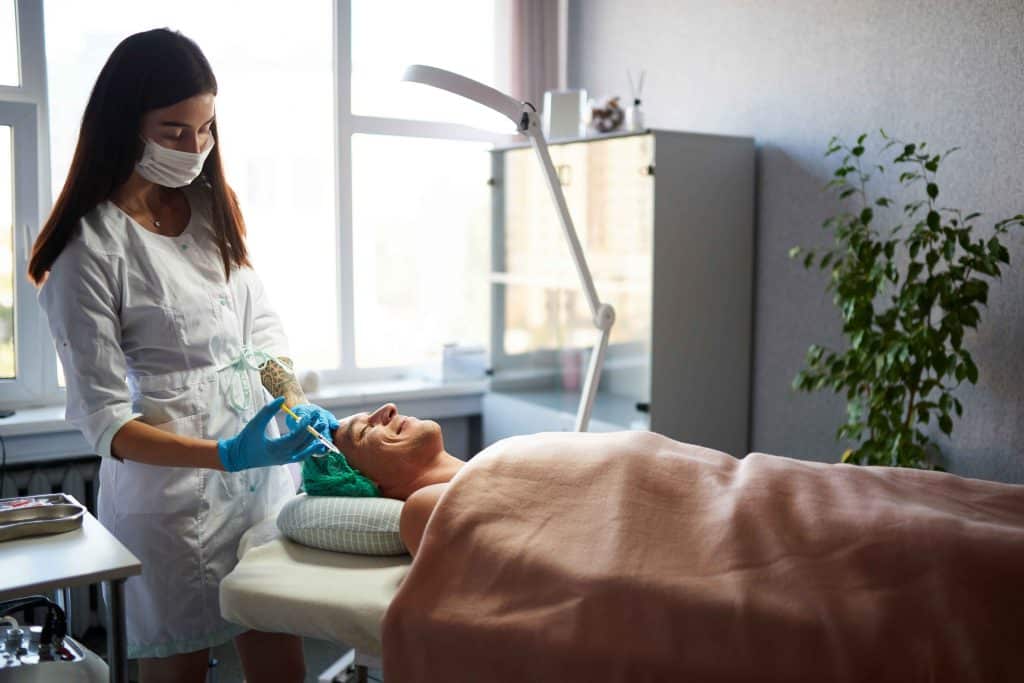With age-related conditions becoming more prevalent, middle-aged and older adults are increasingly exploring non-invasive, regenerative therapies. Among these, stem cell therapy has gained significant attention for its ability to harness the body’s own repair systems.
This article provides a medically sound yet approachable guide to stem cell therapy near me, with particular emphasis on its clinical uses, such as stem cell hair treatment and joint regeneration. It also explores important considerations when selecting a provider, the benefits of stem cell infusion, the role of adult stem cell therapy, and whether stem cell supplements offer meaningful support.
Key Takeaways
- Understand the basics of stem cell therapy, its medical benefits, and its application in various fields.
- Find a reputable stem cell therapy provider by checking credentials, success rates, and patient reviews.
- Select a reliable clinic for stem cell therapy, focusing on licensing, technology used, and proven success.
- Enhance your stem cell therapy results with supplements, lifestyle changes, and regular consultations with your doctor.
Learn more about our Stem Cell Therapy
What Is Stem Cell Therapy and How Does It Work?
Understanding Adult Stem Cell Therapy
Adult stem cell therapy uses the body’s own stem cells—often derived from bone marrow or adipose (fat) tissue—to repair or regenerate damaged tissues. These cells are non-embryonic, meaning they avoid the ethical concerns associated with embryonic stem cells, and are currently the most commonly used type in clinical applications.
Patients often search for “adult stem cell therapy near me” when looking for a localized, minimally invasive solution to issues like joint degeneration, chronic pain, or even aesthetic concerns like thinning hair. This type of therapy offers promise by delivering specialized cells that may:
- Reduce inflammation
- Regenerate tissue
- Slow cellular degeneration
- Improve function in chronic or degenerative conditions

Stem Cell Infusion vs. Targeted Injections
A critical distinction in regenerative medicine is the delivery method of stem cells:
| Method | Description | Best For |
|---|---|---|
| Stem Cell Infusion | Stem cells are delivered intravenously, circulating systemically | Autoimmune conditions, generalized inflammation |
| Localized Injection | Directly injected into joints, scalp, or tissues | Arthritis, injury recovery, stem cell hair treatment |
Patients interested in whole-body wellness or systemic support often ask about “stem cell infusion near me,” while those targeting specific concerns such as joint pain or hair regrowth may be better candidates for localized approaches.
Evaluating a Provider: Navigating Stem Cell Treatment Near Me
The rise in public interest has led to a proliferation of stem cell clinics worldwide. Unfortunately, not all adhere to medical best practices or regulatory standards. To find the right provider for regenerative medicine near me, a critical evaluation is essential.
What to Look for in a Clinic
To ensure patient safety and positive outcomes, seek clinics that:
- Are licensed and regulated by medical authorities
- Employ board-certified physicians in relevant specialties (e.g., orthopedics, dermatology)
- Use autologous or allogeneic cells that are properly processed in accredited laboratories
- Offer documented success rates and peer-reviewed research to support treatment protocols
Key Questions to Ask Before Committing
Before scheduling any procedure, whether it’s for joint relief or stem cells for hair loss, ask your provider:
- What type of stem cells will be used (autologous or donor)?
- What is the exact method of delivery—stem cell infusion or targeted injection?
- Are your treatments FDA-approved or part of a clinical trial?
- What risks are associated with this therapy?
- How many sessions will I need and what are the costs?
This ensures transparency and allows patients to make medically informed decisions about stem cell treatment near me.
Clinical and Cosmetic Applications of Stem Cell Therapy
Joint Health, Pain Relief, and Regeneration
One of the most common uses of adult stem cell therapy is for joint repair, particularly in individuals suffering from osteoarthritis or joint degeneration. Stem cells are injected directly into the joint space to:
- Reduce inflammation
- Stimulate cartilage regeneration
- Delay or potentially avoid surgical interventions like joint replacements
Clinical research continues to show promising outcomes for patients experiencing chronic knee, shoulder, or hip pain.

Stem Cells for Hair Loss: A Breakthrough in Restoration
For many older adults, thinning hair can be a source of emotional distress. Interest in “stem cells for hair loss” and “stem cell hair treatment near me” has grown exponentially due to promising early results.
Stem cell hair therapy typically involves harvesting a patient’s own stem cells from fat tissue or blood, processing them, and injecting them into the scalp to:
- Reactivate dormant hair follicles
- Promote new hair growth
- Strengthen existing hair shafts
- Improve scalp vascularity and health
Although more research is needed, preliminary studies suggest this therapy may offer an effective and minimally invasive alternative to traditional hair restoration methods.
Other Benefits of Stem Cells: Anti-Aging and Skin Repair
When evaluating the overall benefits of stem cells, it’s important to note their potential role in dermatological and anti-aging medicine. Clinical uses include:
- Reducing fine lines and wrinkles
- Repairing sun-damaged or aging skin
- Treating chronic wounds or scars
- Managing inflammatory skin conditions such as eczema or psoriasis
These treatments work by stimulating collagen production, enhancing skin elasticity, and accelerating cellular turnover.
Enhancing Results with Stem Cell Supplements and Lifestyle Changes
Stem Cell Supplements: A Complementary Strategy
Many patients exploring regenerative medicine also inquire about stem cell supplements. These over-the-counter formulations claim to support stem cell production, mobility, and health.
Common supplements include:
- Stem-Kine – Purported to increase circulating stem cells
- Cellgevity – Targets cellular energy and oxidative stress
- Cerluten – Supports neural regeneration
- VitaStem – Marketed for immune system enhancement
Stem Cell Supplements Benefits: Fact or Hype?
Scientific studies on the benefits of stem cell supplements are limited, and most do not undergo the rigorous testing required for pharmaceutical approval. However, some observational research and patient-reported outcomes suggest that these supplements may:
- Support the immune system
- Improve recovery time after stem cell therapy
- Aid in reducing inflammation
It is important to speak with your physician before adding any supplement to your regimen to ensure it does not interfere with ongoing treatments or medications.
Post-Therapy Lifestyle Recommendations
To optimize the effects of stem cell therapy, adopt the following habits:
- Anti-inflammatory diet: High in vegetables, lean proteins, and omega-3s
- Regular low-impact exercise: Such as yoga or swimming to support mobility
- Hydration: Essential for nutrient transport and cellular recovery
- Sleep hygiene: Adequate rest enhances repair processes
These practices enhance your body’s regenerative capacity and may prolong the benefits of your treatment.
Risks, Costs, and Long-Term Considerations
Is It Safe? Understanding the Risks
Understanding the safety of stem cell therapy, it’s crucial to delve into its potential side effects, the risks involved, and the long-term considerations. Like any medical procedure, stem cell therapy isn’t without risks.
- Side Effects: Patients may experience temporary discomfort, infection, and allergic reactions.
- Risks: There’s a chance of stem cells changing into unwanted cell types, failing to work as expected, or triggering the immune system.
- Long-Term Considerations: The long-term effects of stem cell therapy aren’t fully understood yet, raising concerns about potential future health issues.
- Safety: Overall, while stem cell therapy has shown promising results, it’s important to discuss all aspects with a healthcare provider before making a decision. It’s also vital to ensure the therapy is administered by a qualified professional.
Long-term effects of certain procedures, especially unregulated ones, are still being studied. It’s crucial to only pursue treatment in clinics that operate under medical supervision and compliance.

Cost Overview: How Much Does Stem Cell Therapy Near Me Cost?
So, you’re interested in stem cell therapy but how much does it actually cost? The price can vary significantly depending on the type of treatment and the location of the clinic. In the United States, costs can range from $5,000 to $50,000 per treatment. It’s also important to note that insurance companies often don’t cover this therapy because it’s still considered experimental.
Additionally, some clinics might charge extra for consultations or follow-up visits. Beware of clinics that offer ‘too good to be true’ prices, as they may not provide quality care. It’s essential to do your research and understand the full cost before deciding on stem cell therapy. Remember, it’s not just about the price, but the overall value and potential health benefits.
Are You a Candidate for Regenerative Medicine Near Me?
The ideal candidate for stem cell therapy:
- Has a clearly diagnosed condition (e.g., osteoarthritis, alopecia, inflammatory disease)
- Is in overall stable health
- Is seeking alternatives to surgery or conventional medication
- Understands the financial and medical commitment involved
Contraindications may include active infection, cancer, or severe immune dysfunction.
Interested in learning more? Follow us
Conclusion
For those searching “stem cell therapy near me” or “regenerative medicine near me,” the path forward requires careful consideration. The benefits of stem cells—from hair restoration to chronic joint pain management—are promising but not without complexity. By consulting licensed professionals, asking the right questions, and combining therapy with supportive lifestyle changes and stem cell supplements, patients can make confident, informed choices.
Stem cell therapy isn’t a miracle—but for the right patient, at the right time, in the right setting—it can be a transformative option on the journey to better aging.
Frequently Asked Questions
Are There Any Specific Qualifications or Certifications That a Stem Cell Therapist Should Possess?
Yes, a stem cell therapist should have a medical degree and also possess specialized training in stem cell therapy. They should be board-certified and have experience in the specific treatment they’re providing.
What conditions can be treated with stem cell therapy near me?
Stem cell therapy near you may help treat joint pain, osteoarthritis, hair loss, and certain chronic inflammatory conditions. Consult a licensed provider for eligibility.
Is stem cell hair treatment effective for thinning hair?
Yes, stem cell hair treatment has shown promising results in reactivating hair follicles, promoting growth, and improving scalp health. Results vary by individual.
What’s the difference between stem cell infusion and localized injections?
Stem cell infusion delivers cells systemically through the bloodstream, while localized injections target specific areas like joints or scalp for focused treatment.
How do I find a safe and reliable stem cell treatment near me?
Look for licensed clinics with board-certified physicians, transparent treatment plans, and positive patient outcomes. Avoid providers offering unverified claims.
